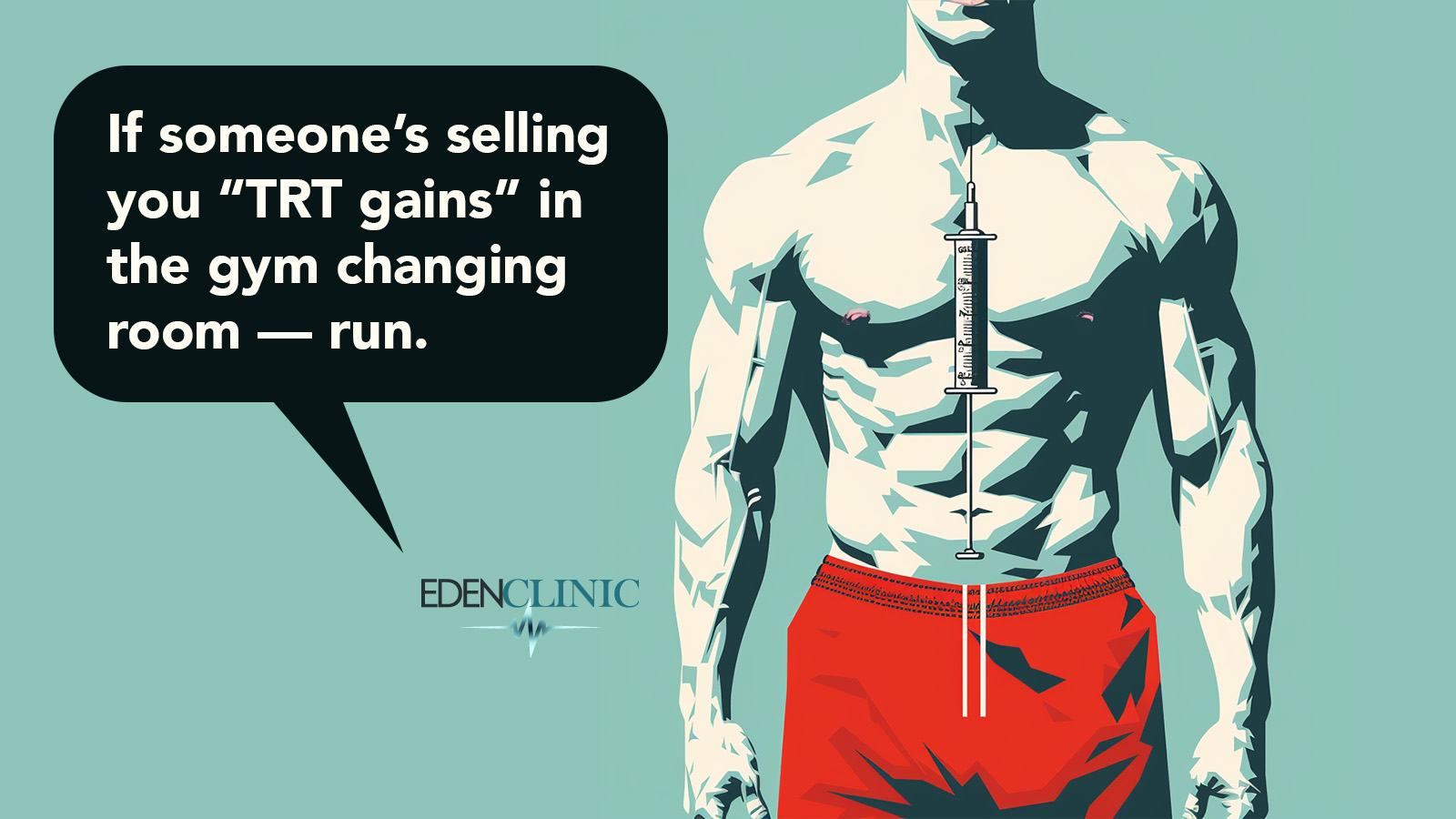If someone’s selling you “TRT gains” in the gym changing room — run.

When men say they feel off their game — low energy, slower recovery in the gym, waking up less sharp — testosterone often gets pulled into the conversation. Maybe you’ve wondered whether TRT (Testosterone Replacement Therapy) is the answer. At Eden Clinic, we believe it’s vital to separate what TRT is, what it might help with, and what the risks are — so you can make an informed decision in partnership with medical professionals.
What Is TRT — and Who Is It For?
- Medical treatment, not performance shortcut. TRT is designed to restore testosterone levels when your body isn’t producing enough naturally, usually due to a diagnosed condition known as hypogonadism. It’s not meant to be used just to chase gym PBs or aesthetic goals.
- Diagnosis is essential. Before anything else: blood tests (often taken in the morning), possibly repeated; evaluation of symptoms; ruling out other causes (sleep issues, stress, metabolic or hormonal disruptions).
- Monitoring matters. Effective TRT involves not just prescribing testosterone via injection, patches, or gels — but regular check‑ups to ensure levels are in the normal range, side effects are tracked, and that you understand potential trade‑offs.
What TRT Can Do — With Proper Indications
When used in people who truly have low T levels, research shows that TRT may offer several benefits:
- Improved libido, sexual function, and spontaneous erections.
- Increased energy, better mood, perhaps some improvements in sense of well‑being.
- Gains in muscle mass, strength, and better recovery.
- Enhanced bone density. eLife+2Mayo Clinic+2
- Reduced body fat, improved body composition. eLife+1
Importantly, these benefits tend to bring you closer to how you were (or could be) pre‑decline — they don’t magically leapfrog you to superhuman performance.
What TRT Can’t Promise — And What Risks You Should Understand
TRT isn't without potential downsides, especially if used without clear medical need or under weak oversight:
- Side effects such as acne, sleep apnea worsening, mood swings, fluid retention. PMC+1
- It can suppress your natural testosterone production. If you stop, your body might struggle to resume its normal hormone levels. Cleveland Clinic+2PMC+2
- Possible increased risks: elevated red blood cell count (which may raise clot risk), worsening of prostate issues (especially if a latent prostate cancer is present), changes in cholesterol metrics, blood pressure. eLife+2Mayo Clinic+2
- The evidence is especially uncertain when TRT is used for age‑related testosterone decline without other health issues. Benefits tend to be more modest; risks may loom larger. Mayo Clinic+2Cleveland Clinic+2
Natural Decline vs Disease
It’s normal for testosterone levels to decline with age — many studies suggest an annual drop of about 0.4% in total testosterone past the mid‑30s, and a sharper fall in free (“bioavailable”) testosterone. BioMed Central+1
But “normal decline” is different from hypogonadism — a condition where testosterone falls outside of normal ranges and symptoms are significant. Not everyone with low testosterone (due to aging) should automatically be on TRT.
Before You Consider TRT: What to Do First
At Eden Clinic, we always advise:
- Review your lifestyle: diet, sleep, stress management, alcohol use, exercise. These often impact testosterone far more than we expect.
- Full medical assessment: ensure your low T symptoms aren’t being driven by another condition (thyroid, sleep apnea, depression, etc.).
- Documented deficiency: lab tests, repeated if necessary, measured in the proper context.
- Understand the treatment path: dosage, delivery method, monitoring schedule, possible side effects, what happens if you stop.
Conclusion: TRT Is Not One‑Size‑Fits‑All
If you’re feeling like your workouts, recovery, mood, or vitality are not what they used to be, TRT might help — but it should never be seen as a short‑cut. The benefits are real for men who truly need it, but so are the potential risks. The key is diagnosis, medical supervision, and realistic expectations.
If you want to explore whether TRT might be for you, Eden Clinic offers complete assessments — from symptom review to blood testing and personalised plans. Reach out and let’s walk this together, not jump ahead based on what social media says.
References
- Mayo Clinic Staff, Testosterone therapy: Potential benefits and risks as you age, Mayo Clinic. Mayo Clinic
- Osterberg EC et al., Risks of testosterone replacement therapy in men, PMC. PMC
- Mohammadi‑Shemirani P, Chong M, Pigeyre M, et al., Effects of lifelong testosterone exposure on health and disease using Mendelian randomization, eLife. eLife
- Cleveland Clinic, What TRT Is, overview. Cleveland Clinic
- Cheng H, et al., Age‑related testosterone decline: mechanisms and implications, 2024. BioMed Central
Join Our Wellness Community
Subscribe for the latest insights on aesthetics, health tips, and exclusive offers from Eden Clinic.



